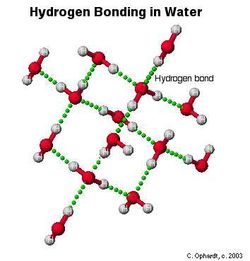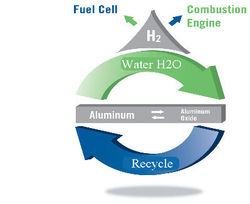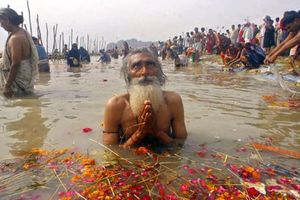Think of this as Volume 12, Number 4 of A-Clue.com, the online newsletter I've written since 1997. Enjoy.
So far we've been selling the idea of a hydrogen cycle (instead of a carbon cycle) as nationalism, as environmentalism, or as a way to make our electrical grid more flexible and robust.
But there is another, even more important argument for the hydrogen economy.
Water.
For thousands of years the history of civilization has been a history of water. Water defines civilization. It can't exist without water.
Read Rushdie's The Enchantress of Florence, or watch Michael Wood's The Story of India, and you learn how central Asia, what's now the deserts of Afghanistan, Turkmenistan, and the "tribal areas" of Pakistan, are the real cradles of civilization. Those civilizations were destroyed as water sources dried up. That's why the Ganges means life.
To give life water must be clean, and the most important technologies of our last century are those devoting to maintaining supplies of clean water. Water purification, water desalinization, these are the most expensive projects we have. And their reach is very limited. Man can't magically create water. He can only preserve, transport, and purify what he has available around him.
Until now.
The hydrogen cycle offers a solution, which is its pollution. You need a water source to create hydrogen, but that source need not be pristine. Ocean water, or brackish water, or water containing other pollutants, can be the source of hydrogen atoms.
Electrolysis takes only the hydrogen on one side, releasing pure oxygen (which could be bottled or vented) on the other side. This process requires power, in the form of electricity, but you also have the opportunity to use wind, solar, and geothermal power far from any electrical grid.
Hawaii, for instance. Barack Obama's home state. In terms of hydrogen Hawaii is like Kuwait. The deserts around Kona have dependable, high intensity sunshine. The volcanoes which created Hawaii provide enormous supplies of geothermal power near the surface. The trade winds that create the islands' micro-climates are reliable and, at altitude, highly dependable. There is water everywhere.
All Hawaii really lacks is infrastructure to tap this power and to get the hydrogen which results to market. Should it be in the form of gas sent east by balloon? Through pipelines? Frozen and sent in great tankers? Perhaps combined with nitrogen to make ammonia, a good we already know how to ship in quantity?
The point is that wherever there is accessible water — not clean but accessible water — and natural energy from the Earth or the Sun, you can site a clean hydrogen plant. I don't know whether Hawaii will become the next Kuwait or whether these plants will be more widely distributed. I suspect the latter.
But now is the time to start finding out.
So far policymakers have only looked at this production side of the hydrogen equation. They have not considered the ramifications of the consumption side.
Wherever hydrogen is consumed as fuel, you create water as pollution. A fuel cell combines hydrogen stocks with oxygen from the air, releasing the power in forming the chemical bonds which make up H2O.
In some early hydrogen car designs this water is vented. My most important message today is that this is madness.
That water must be contained, controlled, and used wisely. That water is produced where power is needed, most of it is produced where there are a lot of people. This makes it the most important element in the whole cycle.
If Afghans can find a way to make peace we can make Herat and Kandahar rise again, with pure water created through the hydrogen power cycle. The deserts can bloom, people can be made healthy, and the more people there are the more water is produced. In places with abundant water the excess can flow to the sea through rivers. But in places without abundant water, and this represents an enormous portion of the world's land mass, this water means life.
Containing this water, not wasting this water, is important if we're to maintain the stability of ecosystems. Desert agriculture must move to drip irrigation systems under plastic sheeting, limiting the exposure of precious water to the surrounding air. It means farming must become industrialized all around the world. This water is not a tool for subsistence farming.
You start to see the dangers. Centralized control of power and water can be the source of terrible dictatorships. Democracy and capitalism must continue to provide better alternatives. Once water makes life possible, growth comes only from willing, active minds, from constant contact. This, through the mechanism of the Internet, is our best protection against tyranny.
The hydrogen economy will truly remake the world in this century. The transformations will be greater than those we saw with the carbon economy of the last two centuries. We do not yet know what malignities may come with this — man's imagination assures some will.
But hydrogen, and its pollution, are the path of life, and we need to seize that path today.














Wow..It is amazing. Thank you for sharing the bonding structure of hydrogen. It looks like you were student of science in school and having great interest in Chemistry.
Wow..It is amazing. Thank you for sharing the bonding structure of hydrogen. It looks like you were student of science in school and having great interest in Chemistry.
Awfully insightful appreciate it, I’m sure your readers may perhaps want further stories like that keep up the excellent work.
Awfully insightful appreciate it, I’m sure your readers may perhaps want further stories like that keep up the excellent work.